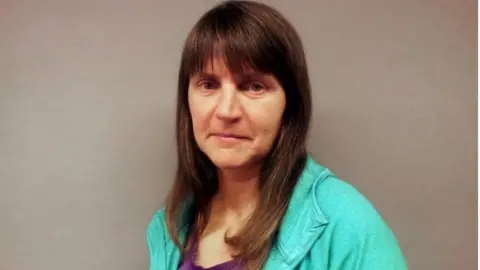Undercover policing inquiry: Chairman urged to quit
Campaigners have walked out of a public inquiry into undercover policing, demanding that the chairman stand down or appoint a full panel.
The inquiry was set up in 2015 to investigate claims of wrongdoing by forces in England and Wales.
But campaigners are unhappy that ex-undercover officers were granted anonymity during the proceedings.
Phillippa Kaufmann QC, representing campaigners, said core participants could not participate meaningfully.
At Wednesday's hearing, Ms Kaufmann read a statement on behalf of campaigners, criticising chairman Sir John Mitting and his decisions around the anonymity of officers.
She said: "If you don't get this right now, then so much of what has gone wrong with undercover operations will remain secret.
"I'm sorry to say this, we have the usual white middle class elderly gentleman whose life experiences are a million miles away from those who were spied upon."
Ms Kaufmann claimed that the reasoning for not releasing the names of certain police officers was "scant and largely uninformative" and said her clients asked chairman Sir John Mitting to recuse himself or to install a new panel.
After the statement was read out, around 60 people, including alleged victims, campaigners and their legal teams, walked out of the Royal Courts of Justice.
Baroness Doreen Lawrence has backed the walk out, accusing Sir John of preventing her from finding out who spied on her family as they sought justice for her murdered son, Stephen.
The inquiry was launched in 2015 after allegations that Scotland Yard infiltrated the Stephen Lawrence campaign 20 years ago.
In a statement, Baroness Lawrence, who could not attend court on Wednesday, accused Sir John of being influenced by his own publicly-stated "old fashioned and naive views".
"He is turning what should be a transparent, accountable and public hearing into an inquiry cloaked in secrecy and anonymity," she said.
"I want to know the names of the police officers who spied on me, my family and our campaign for justice. The chair is not allowing that, in my view, for reasons which are completely unjustifiable and unreasonable."
She called on Sir John to resign or for a panel to be appointed "before any more public money is spent", adding: "Anything less than this will lead me to consider carefully whether I should continue to participate in this inquiry."
'Complete lack of disclosure'
A woman known as Cathy, from campaign group Police Spies Out of Lives, said Sir John's appointment "seems to give more weight to the privacy of the officers" rather than the alleged victims.
She said: "We've all been disappointed at the slow rate of progress and the complete lack of disclosure."
"There are two key questions. What were the cover names, and which groups were spied on?
"Without those two bits of information it's nigh-on impossible for people to come forward to say this is what happened to me and my group."

Analysis
By Dominic Casciani, BBC home affairs correspondent
The undercover inquiry is now three years old - and so far behind schedule that it was already meant to be delivering its final report to ministers.
Instead it has become mired in a legal stand-off that this morning became personal with a remarkable attack on a High Court judge by a leading barrister.
In the majority of anonymity applications that Sir John Mitting has so far assessed, he has been minded to protect officers' identities in some shape or form.
He is adamant he can get to the bottom of wrongdoing - but campaigners say that's impossible unless they are told who the officers targeting political groups were.
It is not remotely clear where the inquiry goes from here.

One of the women that brought the court action against the Metropolitan Police said her experience of undercover policing "completely ripped apart my life".
Helen Steel said she was "deceived" into a two-year relationship with an undercover police officer called John Dines, who she later discovered had infiltrated the London Greenpeace organisation in the 1980s.
"We lived together, we talked about planning a family and we talked about spending the rest of our lives together," she said.
"After a while he began acting strangely and seemed to go through a mental breakdown and then he disappeared."
He left home in 1992, and Ms Steel later found out that he had been using the identity of a dead child.

The Undercover Policing Inquiry (UCPI), launched by the then-Home Secretary Theresa May, was due to finish this year, but has been beset by delays - including the death of its original chairman Sir Christopher Pitchford.
It is expected to take another year before all the evidence is heard.
The allegation being looked into by the inquiry is that undercover policing units that had developed over 40 years were out of control.
Incidents included:
- Officers from the Metropolitan Police force's now disbanded Special Demonstration Squad (SDS) tricking women, whom they were targeting, into sexual relationships
- Some of them used the names of dead babies to create a cover story complete with birth records
- Some of these infiltrations led to proven miscarriages of justice
- The most toxic allegation that triggered the inquiry was that an officer infiltrated the Stephen Lawrence justice campaign
